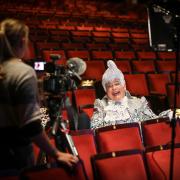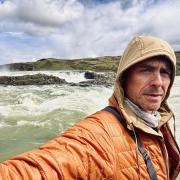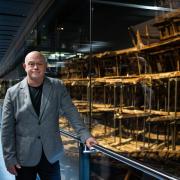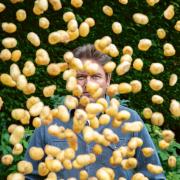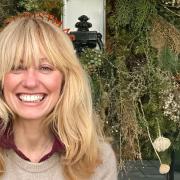Saving the world’s wildlife is Chris Packham’s mission, but nowhere grabs his attention more than his favourite place, the New Forest says Peter White

As a naturalist, wild life enthusiast and television presenter, Chris Packham has travelled the world seeking out the unusual and spectacular.
But whether he is in the snowy wastes of Antarctica or the heat of an equatorial rain forest, Chris maintains that one of his favourite sights occurs right on his doorstep, in the heart of the New Forest.
Born and brought up near Southampton, Chris has subsequently lived in the New Forest all his life. He loves the area with a passion, and as well as seeing sights that continue to captivate and enthral him, he also encounters issues that he is far from happy about.
Chris, who will be back on our TV screens soon with the launch of this year’s ever-popular Springwatch programme, says: “My favourite part of spring without a doubt is when the beech trees in the New Forest break into bud. Normally it’s around the second week in May, after the catkins, snowdrops and primroses have come and gone. As I drive towards Ashurst there are some beech trees on the side of the road, and when the leaves first break out they are an incredible shade of green, and translucent.
“I have never seen the intensity of that green colour anywhere else in the world - it is beautiful and very special. On a sunny day with the light coming through the leaves it is one of the most awe-inspiring and uplifting sights for me. At that time the leaves are edible, and can be used in salads. But it only lasts a few days before the trees pump toxins into the leaves, to save them from predators.
“Of all the places in the world I travel, it is undoubtedly one of my favourite sights. It’s like being under a great stained glass window. People tend to forget we have some extremely glamorous and exotic things in our own backyard, and I fight very hard to ensure familiarity doesn’t breed contempt.”
When Chris finds time to relax, which is not very often, he likes nothing more than walking his two poodles, Itchy and Scratchy in the Forest. He always makes sure they are kept on their leads, and admits he becomes very irate when he sees dog walkers letting their pooches run free.
“I care more about the New Forest and its habitat than anywhere else because it’s my home. I feel part of it, as many others do. But there are a huge number of issues that reduce the New Forest, and also imperil it and potentially damage its future,” he claims.
“I am always encouraging people to go in the countryside. You can see it on TV, but to satisfy that interest you have to go and see it for yourself. I always say ‘come and see what I see, it’s better than watching it on TV’. A huge number of people go to the New Forest, and one of the things that is damaging it are dogs off leads. No fewer than 45 per cent of birds that breed there are ground-nesting species, and there are too many dogs off leads in the breeding season, so that needs to be regulated.

“People have no right to damage that environment, and I feel my job is to explain why the dog is damaging it, so it’s an educational exercise. But I also think it’s time for some legislation to say that in this area during the breeding season dogs must be kept on leads.
“The New Forest is like a pie with many fingers in it, and a lot of those fingers have selfish interests which for me is disappointing. We should be working together to make sure it has a sustainable future. We still want people to be living and prospering there in 100 years’ time, but if we carry on doing what we are doing at the moment they won’t be able to, and that’s not good.”
Chris, now 54, was educated at Bitterne Park Secondary School, Richard Taunton College and the University of Southampton. After graduating, he cancelled his study towards a PhD to train as a wildlife cameraman. But he has been interested in nature and wildlife for as long as he can remember, even when he was a toddler in his garden at home, seeking out the likes of ladybirds, tadpoles, slow worms and small lizards.
He recalls: “I was brought up in Midanbury, which was quite near some wasteland and would rummage for all sorts of wildlife. By the time I was four or five, I was possessed by anything I could touch and put in a jar. Eventually my interest grew and we ended up with a house full of badgers, foxes and owls - all sorts of things.
“The RSPCA, who originally came round to confiscate my birds, because it was illegal to keep them, ended up bringing birds to me to look after. I suppose the first things I started watching that I couldn’t capture, so to speak, were some fox cubs behind our house. I would sneak out every night to watch them when I was about seven.
“Until I was about 13 I wanted to be an astronaut. The Apollo programme was on and it was amazing seeing men bouncing around the moon, as well as sci-fi films on TV, which I still watch. But then my biology teacher at Bitterne Park got me studying birds and mapping out nests, so I had made up my mind I wanted to study birds for the rest of my life. I changed my mind again when I got to about 24, and wanted to study animals.”
That fascination has never wavered, as he demonstrates on the many television programmes he has presented. He first came to our screens in the 1980s in the BAFTA-winning children’s programme The Really Wild Show. Since then he has been a regular in many a production, including Springwatch, Autumnwatch and Winterwatch.
He continued: “I have always wanted to understand things about animals that no one else had previously understood. There was that curiosity and a need to know. A lot of stuff wasn’t known in the days when I started, and certainly not accessible to me - there was no internet then. I had read every book in the library about wildlife, but they didn’t come up with the answers.
“Just being with animals is something I found rewarding, but I can’t just look at them - I need to know what’s going on. My challenge is to make more people feel the way I do about wildlife, and help me look after it because it is in such a bad way.

“I recently returned from Antarctica. It’s a relatively unspoiled part of the planet, not a perfect paradise, but more intact than many parts of the world. The wildlife is largely tame and approachable, so you can go and sit in a colony of 100,000 penguins, which is great.”
He continued: “Springwatch this year is back in Suffolk. I get so excited about the series because every programme goes out live, and we don’t know what’s going to turn up. There’s huge audience interaction which is encouraging. We are also doing ‘Get Involved in Nature’ events around the UK as part of the programme, which will be launched in Easter. It’s going to be a very unusual spring this year after such a mild winter, so that will be another challenge for us.”
Chris openly admits the intensity of his work makes him a fairly unsociable person. He has a very small circle of close friends, and always tries to avoid party gatherings. He smiled: “I don’t even do Christmas because that’s when everybody stops, and I don’t want to stop. I don’t have time for socialising, I just want to get on with work.”
He admits his campaigning to try to help the environment, and even to try to ensure the foxhunting ban is never lifted, does not go down well with everyone. He says: “Some people who don’t share my views on environmental issues can be very unpleasant, especially on social media. But that doesn’t get to me at all… I just let it go over my head.
“I don’t often come into contact with people who don’t like me - unless they happen to like foxhunting, and then they try to make my life as miserable as possible. If anyone ever succeeded in making me angry, which I would never acknowledge, it would just make me try harder.
“As for my campaign against foxhunting, how can we say the New Forest is a nature reserve and wildlife is important, and then twice a week let people go out with dogs and tear foxes to pieces? Foxhunting is nasty so let’s just stop it for good. I don’t mind people getting dressed up and going out on their horses if they have a human runner who goes out and lays a trail to be tracked.
“It’s still the fun of galloping through the countryside, but the foxes are not being killed. I would be happy with that and so would most people. If they want, I’ll dress up as the fox, get my trainers on and do some running through the woods if it will make people stop killing foxes.”
Chris recalls how the banks of the River Itchen were a very important part of his upbringing. He used to go along a stretch near Eastleigh with his father, gazing into the water hoping to spot a fish. Now he says: “The problem in Hampshire is we can’t get near river banks any more, because they are privately owned, usually with expensive fishing. I haven’t been able to explore the water courses and they are full of beautiful life.
“We have otters, salmon and fabulous wildlife, which I haven’t been able to access. If I had one ambition it would be for all the Hampshire Water Bailiffs to take a week off, so people like me could just wander along the river banks.”
More…
• What celebrities love most about Hampshire - Some of Hampshire’s best known personalities have revealed what they most love about the county. Here, we compile some quotes from our interviews over the years
• Ed Chamberlin on growing up with sport, charity work and working with Matt Le Tissier - Obsessed with sport from a young age, Sky Sports’ Ed Chamberlin talks to Andy Greeves about his love for Southampton FC and how the city’s hospital saved his life




